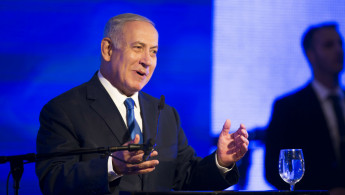Netanyahu seeks 'open ties' with Saudis, Arab states at anti-Iran summit
The US-led summit starting on Wednesday aims to promote 'peace and stability' in the Middle East - but with Iran uninvited and several Arab states boycotting the summit, its prospects of success are unclear.
Netanyahu on Wednesday suggested he would make public Israel's covert normalisation of ties with many Gulf states. He said his country enjoys "very good relations" with all Middle East countries barring Syria.
"As of now, they are already cooperating with us," Danny Danon, Israel’s UN ambassador said recently, in reference to Arab Gulf states led by Saudi Arabia and the UAE.
"We ask them to recognise us and not to be ashamed for using our technology or our defence systems."
The ambassador predicted that once normalised relations with one Arab state were made public, others would follow suit and announce ties with Israel.
Recent months have seen reports of increasing ties between Israel and the Gulf states. Netanyahu visited Oman in October 2018 and Israeli ministers visited the UAE in November that year. Behind the scenes cooperation between Tel Aviv and Riyadh is an open secret.
Although Riyadh denies warming behind-the-scenes relations with Israel, Saudi leaders have made several public gestures towards Israel in recent months.
Both countries see Iran as their biggest outside threat and the US as their key ally. But the Israeli-Palestinian conflict has long proved an obstacle to official relations.
In April, during an interview with The Atlantic, Saudi Arabia's Crown Prince Mohammed Bin Salman said Israel had a "right" to a homeland, prompting King Salman to scramble to reject his son's declaration. The crown prince also reportedly said Palestinians should accept a peace deal with Israel or "shut up".
Read more:
The cautious détente between Saudi Arabia and Israel
Palestinian Foreign Minister Riad Malki announced on Monday that the Palestinian Authority would boycott the summit, which he called "a plot against the Palestinian cause". He called on Arab states to either boycott or send low-level delegations.
Both Lebanon and Turkey are boycotting the Warsaw summit. There will also be a conspicuous European absence, with Russia, the foreign ministers of France and Germany, and EU policy chief Federica Mogherini not attending the two-day summit.
The Israeli prime minister said the main focus for the summit would be Iran’s role in the region, which he called an issue that "unites Israel, the United States, [and] many countries in the world".
A senior US official told Reuters that foreign ministers and senior officials from 60 nations would discuss "what we can do to help get Iran on a more helpful footing that it has been, to collectively push back on some of its malign behaviour in the region".
Iran called the summit a "desperate anti-Iran circus".
US Middle East envoy and Trump son-in-law Jared Kushner will reportedly unveil details of the Trump administration’s long-anticipated Israel-Palestine peace plan, dubbed the "deal of the century" by many.
Netanyahu said he was sceptical that the plan would be discussed.





 Follow the Middle East's top stories in English at The New Arab on Google News
Follow the Middle East's top stories in English at The New Arab on Google News
![The UAE is widely suspected of arming the RSF militia [Getty]](/sites/default/files/styles/image_330x185/public/2024-11/GettyImages-472529908.jpg?h=69f2b9d0&itok=Yauw3YTG)
![Netanyahu furiously denounced the ICC [Getty]](/sites/default/files/styles/image_330x185/public/2024-11/GettyImages-2169352575.jpg?h=199d8c1f&itok=-vRiruf5)
![Both Hamas and the Palestinian Authority welcomed the ICC arrest warrants [Getty]](/sites/default/files/styles/image_330x185/public/2024-11/GettyImages-2178351173.jpg?h=199d8c1f&itok=TV858iVg)